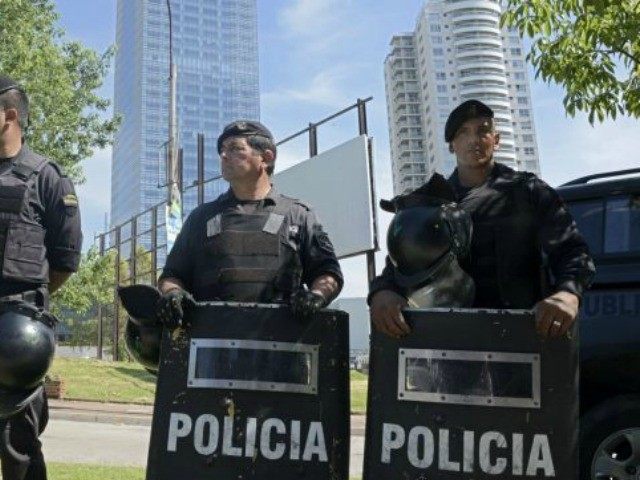Uruguay’s Minister of Foreign Affairs Luis Almagro has ordered extra security protection for the Israeli embassy in Montevideo, as well as for individual Jewish diplomats and at specific Jewish community events, in response to the discovery of an explosive device last week by the embassy and subsequent mystery regarding an Iranian diplomat believed to be involved.
Almagro explained in a radio interview with El Espectador that he had ordered extra protection for Uruguay’s Jewish community and Israel’s diplomats out of an abundance of caution. While he stated categorically that “there has not been in Iranian threat” against either Israeli diplomats specifically or the Jewish community in general, he was interested in establishing “absolute prevention” and “special precautions” in response to “an atmosphere of troubled waters.”
“I’m preventing situations from happening,” Almagro continued to explain. “There is not a concrete threat, but rather weird facts: a suitcase near a garbage container, another device further on and out of the camera’s sight. Some things I don’t like.”
Almagro refers to a bomb found in a suitcase near the Israeli embassy in Montevideo last week. The bomb partially detonated but did not cause any damage. The man believed to have organized the bombing, a senior Iranian diplomat working out of his nation’s embassy in Uruguay, was first reported to have been expelled from the country after the act, but the Uruguayan government later clarified that he had fled. The Iranian government claimed that he returned to Tehran the day after law enforcement found the bomb simply because his duties in Latin America had been completed, not as a flight out of the country.
The man has been identified as 32-year-old Ahmed Sabatgold, who reports long before the bomb mystery have described as “a well-known Holocaust denier [who] often spoke out against Jews,” and had held a high position as translator for Iranian president Mahmoud Ahmadinejad when meeting with late Venezuelan leader Hugo Chávez.
In addition to unilaterally increasing the security of the Israeli embassy and greater Uruguayan Jewish community, the government has called upon the Israeli government to help in security cooperation. “Immediate help was requested to prevent and protect the Embassy of Israel, its officers and the Jewish community in Uruguay. Also, a door was opened to Israeli cooperation on security,” the Uruguayan Foreign Ministry said in a statement.
The situation highlights the already delicate relationship between Iran and the Southern Cone, and its timing is particularly damning for the Iranian government given a separate scandal in neighboring Argentina. There, authorities are investigating the death of prosecutor Alberto Nisman, who was shot in the forehead hours before testifying before the nation’s legislature that the current Argentina government had conspired to protect Hezbollah terrorists from international authorities regarding the bombing of the Argentine Israeli Mutual Association (AMIA), the deadliest terrorist attack in Argentina’s history.
Iran boasts significantly less troubled ties with the Argentine government than with Uruguay, however– and those who believe Iran had a hand in Nisman’s death would argue that his shooting is proof of why Iran continues to trade with Argentina. With Uruguay, national newspaper El Observador describes the relationship as “characterized by an elevated volatility,” with even traditional trading for rice and other crops in a worse state than usual in the history of their bilateral relations.
The discovery of a bomb suspiciously timed with Iran recalling an ambassador notorious for his anti-Semitism will likely do little to endear the Uruguayan government to the Shiite Muslim state though, without Iran’s cooperation, finding those responsible for threatening Israel’s embassy and bringing them to justice will be significantly more challenging than with a cooperative state.

COMMENTS
Please let us know if you're having issues with commenting.